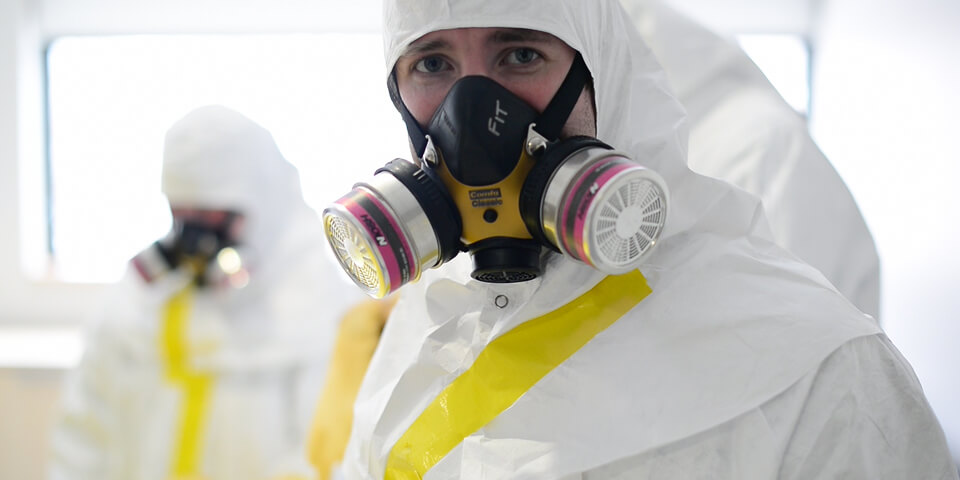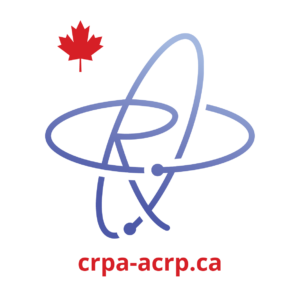Algonquin College Is Well Situated to Offer Training for Ontario’s Nuclear Sector

An Algonquin College student in the Applied Nuclear Science and Radiation Safety program in contamination protection clothing. Photo provided by Algonquin College.
The Chalk River Labs of Canadian Nuclear Laboratories (CNL) employs hundreds of Algonquin College graduates. Among those graduates are employees who have completed the two-year Applied Nuclear Science and Radiation Safety program, which was designed in partnership with the nuclear sector more than 15 years ago.
Location, location, location!
As World War II came to a close, the Ottawa Valley was establishing itself as the centre of Canada’s emerging nuclear industry. In 1945, the first controlled nuclear chain reaction outside of the United States occurred in the small hamlet of Chalk River, leading to the establishment of Atomic Energy of Canada and what is now CNL’s Chalk River labs.
Now, more than 70 years later, CNL is reinventing itself as it further establishes itself as the epicentre for nuclear research and aligns itself with post-secondary schools to open the door to more collaboration with colleges and universities. Algonquin College’s Pembroke Campus is uniquely positioned to support CNL because of its close geographical relationship with one of Renfrew County’s largest employers.
Evolving to serve industry needs
The Applied Nuclear Science and Radiation Safety program was originally an eight-month certificate program called Radiation Safety. When the college received requests from industry to enhance the curriculum, the program was extended to a two-year diploma program.
Co-operative education was also added to the program, giving students the opportunity to participate in a four-month paid co-op work experience, which has proven beneficial for both the students and employers, including the three big nuclear employers in Ontario—CNL, Ontario Power Generation, and Bruce Power.
Our students
The Applied Nuclear Science and Radiation Safety program attracts students from across the country. Graduates may find employment as contamination monitors, radiation protection technicians, radiation surveyors, health physics technicians, radiation safety officers, and naturally occurring radioactive material (NORM) technicians.
The program is particularly attractive to students in the three areas of the province that are at the heart of the nuclear industry. Refurbishment of the large nuclear power plants along the Highway 401 corridor and on the Bruce Peninsula, coupled with the expanding research activity in Chalk River, have created labour market pressures in the nuclear sector.
Endorsed by industry
John Gorman, the president and CEO of the Canadian Nuclear Association, recently said, “Canada’s nuclear sector is set for dramatic growth over the coming decades, with multiple projects announced and underway. This growth represents a major opportunity for trained and qualified workers who want to contribute to Canada’s clean energy future.”
He added that, “Algonquin College’s Applied Nuclear Science and Radiation Safety program provides students with the knowledge and training necessary to join one of the country’s most dynamic and promising industries.”
Our faculty
The program begins every fall at the Pembroke Campus, and many of the classes are taught by faculty who have years of experience working in radiation protection. These subject matter experts are well connected to the industry and help create enhanced learning opportunities for students that include field trips, guest speakers, and co-op placements for students who maintain a high academic standing during their program.
 Jamie Bramburger
Jamie Bramburger
Jamie is the interim dean of Algonquin College’s Pembroke Campus. His primary role for the past 25 years has been manager of Community and Student Affairs. Trained as a broadcast journalist, he spent 13 years in radio and television before joining Algonquin College in 1999.
Do you want to read more articles like this?
The Bulletin is published by the Canadian Radiation Protection Association (CRPA). It’s a must-read publication for radiation protection professionals in Canada. The editorial content delivers the insights, information, advice, and valuable solutions that radiation protection professionals need to stay at the forefront of their profession.
Sign up today and we’ll send you an email each time a new edition goes live. In between issues, check back often for updates and new articles.
Don’t miss an issue. Subscribe now!
Subscribe

 Jamie Bramburger
Jamie Bramburger
